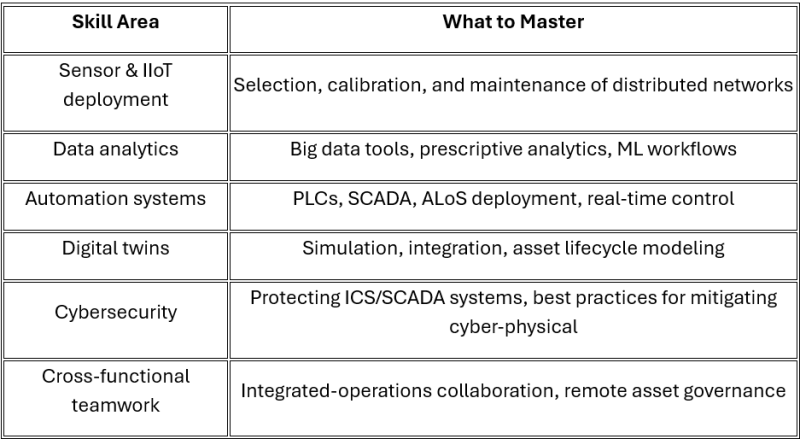The oil and gas industry is undergoing a digital revolution powered by automation, sensors, artificial intelligence (AI), and integrated operations. These “smart fields” demand engineers who understand not just geology and drilling, but data analytics, real-time control, and cyber‑physical systems. This article examines the technology behind smart fields, their benefits, and the skills that petroleum engineers must acquire to thrive.
What Are Smart Fields?
Smart fields, sometimes called intelligent or digital oil fields, leverage networks of sensors, the Industrial Internet of Things (IIoT), data analytics, and automated control systems to enable real-time monitoring and optimization (SPE 195095). They represent a convergence of people, processes, and technology aimed at maximizing efficiency, recovery, safety, and cost effectiveness. Smart wells equipped with wireless sensors allow operations teams to remotely monitor performance and make adjustments.
Technology Stack Behind Smart Fields
- Industrial Internet of Things (IIoT) and sensors: Networks of peta‑byte‑scale sensors capture pressure, flow, temperature, vibration, and chemical data at scale. These feed upstream analytics and automation layers.
- Data analytics and AI: Machine learning (ML) and prescriptive analytics turn raw data into optimized decision-making, from electric submersible pumps (ESP) maintenance to drill parameters.
- Digital twins: Virtual replicas simulate asset behavior and test production scenarios before interventions.
- Integrated operations (IO): Collaborative platforms link offshore and onshore teams through shared real-time visualizations, enabling faster, better-informed decisions.
Expected Impact on Operations
Smart fields offer quantifiable gains in recovery, safety, and reliability. Integrating digital workflows helps reduce production deferment, prolong asset life, and allow rapid response to changing reservoir conditions (Energies, 2024).
Skills Engineers Must Build

Building Future‑Proof Engineers
Developing engineers who are equipped for the evolving demands of smart fields requires a multifaceted approach to education and professional development. Modern engineering programs are increasingly embedding modules focused on data science, industrial automation, and ML within petroleum-related curricula. These foundational skills enable engineers to work effectively in digitally connected environments and contribute meaningfully to data-driven operations.
Beyond formal education, professional training in areas such as data analytics, control systems, and field instrumentation is essential. Certifications covering PLCs, SCADA systems, and industrial cybersecurity enhance an engineer’s ability to deploy and manage automation in real-time production settings.
Practical, on-the-job learning is equally important. Exposure to integrated operations environments, where multidisciplinary teams collaborate using real-time data from remote assets, reinforces digital competencies and fosters system-level thinking. By combining technical knowledge with operational experience, engineers are better prepared to adapt to emerging technologies and lead in the transition toward intelligent energy systems.
Challenges to Address
- Organizational readiness: Implementing smart fields requires strong leadership alignment, defined data governance, and incentives for adoption
- Cybersecurity risks: IIoT deployments increase the surface area for cyber threats. Engineers must integrate security into every layer of digital field architecture.
- Sustaining gains: Digital optimization must become business-as-usual, not a one-off project. Continuous training and institutional memory are vital.
Conclusion
Smart fields are transforming oil and gas into data-rich, responsive, safe, and efficient industries. Petroleum engineers who embrace sensor networks, data analytics, automation, and digital twins will be front-runners in this transformation. The future demands hybrid engineers, fluid across traditional subsurface disciplines and digital technologies. As smart fields become the standard, mastering these skills will not only protect careers but also drive the next era of energy innovation.
For Further Reading
SPE 195095 A Comprehensive Review of Smart/Intelligent Oilfield Technologies and Applications in the Oil and Gas Industry by C. Temizel, Aera Energy, C. Canbaz, Ege University, Y. Palabiyik, Istanbul Technical University, et al.
Smart Oil Fields, a Reservoir of Emerging Technologies by A. Rehman and D. Druhora, CiSOFT.
Digital Drilling: The Tech Skills Future Oil and Gas Jobs Will Demand, Energies Media


